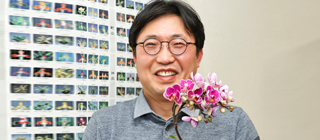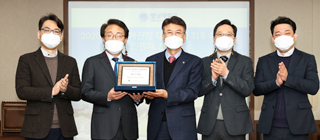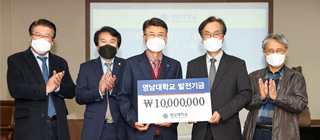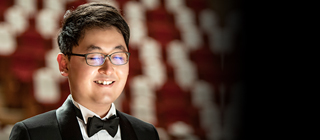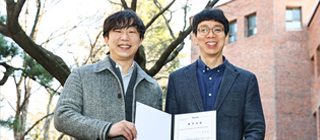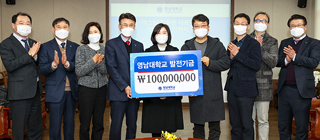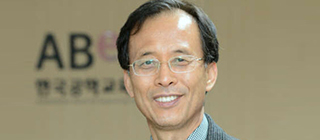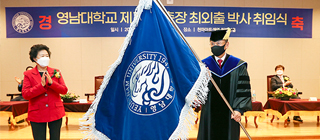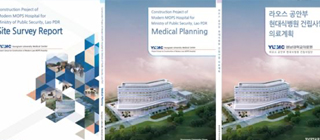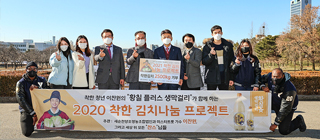-
Achievements from joint work of the Dep. of Horticulture & Life Science Professor Park Gyeong-il and IPET and farming companies ‘Phalaenopsis’ cultivated at a floriculture farm in Ulsan exported to US for the first time... Expected to export 100,000 flowers this year Creating a stable profit model for farms as it has small variability and it is possible to continuously export at large quantities [3/4/2021] YU (President Choi Oe-chool) opened export channels for floriculture farms through industry-academic cooperation. Phalaenopsis cultivated at the floriculture farm Songjeong Garden in Ulsan was exported for the first time to the US in February. A total of 100,000 Phalaenopsis flowers will be exported to the US this year from this farm. Phalaenopsis is known for its flower that looks like butterflies, and it is a popular because of its extravagant beauty. The role of YU Dep. of Horticulture & Life Science Professor Park Gyeong-il (52) was decisive for making it possible to export. Prior to 2017, it was impossible to export Phalaenopsis in pots to the US, but exports became possible after making agreements on quarantines with the US after 2017. However, there were no qualified cultivation greenhouses that met the quarantine standards in Korea at the time, and it was necessary to develop technologies such as for the production and cultivation of seeds and seedlings, transportation pre-treatment, transportation, and transportation post-treatment. Professor Park's research team began the project in 2017 with the Institute of Planning and Evaluation for Technology in Food, Agriculture and Forestry (IPET) and constructed greenhouses that were suitable for exporting to the US after receiving approval from the US Dep. of Agriculture for two farming corporations located in Taean (Sangmiwon Farming Cooperative) and Dongducheon (Dongcheonnanwon) in 2018, thereby procuring an export channel. In 2019, Phalaenopsis was exported for the first time in pots and it constructed the third greenhouse at Songjeong Farm in Ulsan last year to begin exports in February of this year. Currently, the YU research team is carrying out industry-academic cooperation projects with Konkuk University and four agricultural corporations. Professor Park carried out the first sub-project ‘Selection of Korean Phalaenopsis varieties for exporting to the US and development of high-quality plantling production technology,’ while also overseeing all five sub-projects. The domestic flower market has a small market and high price volatility and floriculture farms are currently on the brink of extermination due to the years of slow economy and the spread of COVID-19 since last year. If floriculture farms collapse and it becomes necessary to depend on import flowers, prices will rise and become a greater burden for consumers. Furthermore, if floriculture farms switch to other crops such as vegetables or fruits, it can have an impact on the entire agriculture market. Professor Park said, “The flower export market has lower prices than in Korea, but volatility is smaller and it can continuously take in large amounts, thereby making it possible to create stable profits through economy of scale.” He added, “Exports of Phalaenopsis to the US will revitalize the domestic flower industry and not only present a stable profit creation model of floriculture farms, but also stabilize the agriculture consumption market,” as he explained the outcomes of the recent industry-academic cooperation. The major research fields of Professor Park are tissue culturing and flower color molecular genetics. Professor Park said, “There are still many areas that are deficient compared to our competitor, Taiwan, for exporting Phalaenopsis. We plan to conduct supplementary research so that exports can continue. We are also looking for ways to cultivate and sell the flowers in the US.” He added, “Like this case with Phalaenopsis, overseas exports of the farming industry are possible only through a combination of assertive investments by corporations and cooperation from the Rural Development Administration, Ministry of Agriculture, Food and Rural Affairs, and local government organizations. It is crucial to help the industry take root through ongoing industry-academic-research-government cooperation. Efforts are needed to establish a sustainable export process by forming export farm organizations.”
-
Corporate employee evaluations such as Samsung CNT and Hyundai Development Company in the ‘2020 College Evaluations by Industries’ Selected as outstanding department for third time since 2012 and 2016, for ‘official recognition of excellence in educational course’ Selected as best university in the metals, food, biopharmaceuticals, oil refining petrochemical, electronic semiconductors, and information communication sectors [March 4, 2021] The YU School of Architecture (major in architectural engineering) was selected as the ‘best department’ by corporations. The Korean Council for University Education announced the results for the ‘2020 College Evaluations by Industries.’ In these evaluations, the YU School of Architecture (Architectural Engineering) was selected as the best department. The YU School of Architecture (Architectural Engineering) was selected as the best department for the third time since the 2012 and 2016 evaluations, once again proving the excellence of its educational course. Corporations directly evaluate school departments in the College Evaluations by Industries. The purpose of this is to present directions for college curricula that reflect industry needs to support the fostering of human resources customized to industries. This has been held every four years since 2008 and this year, it evaluated departments related to architecture (construction) and mechanical (automobile) sectors. This evaluation that was conducted on 81 departments of 53 colleges selected 12 departments in 12 universities including the YU School of Architecture (Architectural Engineering) in the architecture (construction) sector and 13 departments in 13 universities in the mechanical (automobile) sector as the best departments. This evaluation was conducted by an evaluation committee made up of employees from 20 companies such as Samsung CNT, Hyundai Development Company, Daewoo Construction, Lotte Construction, and the Construction Association of Korea, and college evaluation experts. The evaluation committee made its assessments focusing on the three fields of industry-based curriculum design (30%), curriculum operation (50%), and curriculum operations achievements (20%). The YU School of Architecture (Architectural Engineering) received good evaluations in ▲rate of offering classes in need by industries ▲consistency of industry needs with curriculum contents ▲industry needs curriculum completion rate ▲industry needs curriculum operations systems evaluation ▲industry-based curriculum operation performance. In addition, the YU School of Architecture major in architecture first received certification in 2007 from the Korea Architectural Accrediting Board (KAAB) and has received a six-year architecture education accreditation from 2021, thus receiving its fourth straight accreditation. Up until now, YU was selected as the best university in the College Evaluations by Industries in architecture (construction (2020, 2016, 2012), metals and food (2019, 2015), biopharmaceuticals (2018, 2014), oil refining petrochemicals (2017), and electronic semiconductors and information communication (2013).
-
Delivered department development fund for students before retiring on February 28 Donated to college development fund throughout his employment totaling ‘50 million KRW in donations’ Led the official ‘BAJA SAE Korea’ of the Society of Automotive Engineers for 25 years [February 25, 2021] YU Department of Automotive Engineering Professor Hwang Pyeong (65) donated development funds for his students as he ended his 39-year teaching career. Professor Hwang, who will be retiring on February 28, met with YU President Choi Oe-chool and donated 10 million KRW for development funds in the morning of the 25th. Professor Hwang continuously donated to the college development fund during his tenure and his total donations amounted to 50 million KRW. Professor Hwang said, “I started working as a professor when I was still young and made academic endeavors and many memories with my students all around the YU campus. As I leave YU, where I have learned and gained so much, I have donated to the development fund hoping that it can help my students. Even when I leave the campus, I will always root for YU and its students.” In response YU President Choi Oe-chool said, “On behalf of the university, I wish to thank Professor Hwang who contributed to fostering students and the development of the university while serving at YU for almost 40 years. I have nothing but respect for Professor Hwang who so generously shares with the university and his students even as he leaves. I will make sure that Professor Hwang’s donation in the development fund will be spent to convey his will.” Professor Hwang was appointed as a professor of YU in 1982 and engaged in education and research for 39 years. He also served as the Student Capacity Development Office Director and the HuStar Innovation Academy Future Automobile Project Team Leader. In particular, Professor Hwang worked not only in the lab and lecture halls, but also worked with students to gain field experience and practical knowledge. One major achievement of his is the ‘BAJA SAE Korea’, a festival of engineers around the world held at YU every year in July. Professor Hwang has been leading the operation of this tournament for 25 years since the first one held in 1996 until last year. Professor Hwang created a self-made automobile club called ‘YUSAE’ in 1995 and from 1996, YU has been hosting the BAJA SAE Korea. This tournament became an international tournament officially recognized by the US Society of Automotive Engineers (SAE).
-
Graduated YU Major in Voice on the 22nd ‘Fun college life’ with fellow students sharing the same interest of ‘music’ “Want to do moving music on stage... I will become a vocalist recognized by the audience” [February 22, 2021] “I want to step on stage as a performer that does music that moves the audience. I also want to hold performances with public benefit purposes to share hope through song with youths. Above all else, I want to become a vocalist recognized by the audience.” A student who majored in voice by overcoming his visual impairments to perform hope will take his first step as a ‘professional vocalist.’ He is tenor Kim Min-soo (22, left on photo) who graduated from the YU School of Music. Mr. Kim has a grade-3 visual impairment. He suffered from an eye disease since he was young and slowly lost his eyesight. At about his third year in middle school he fell to a state of low vision (visual impairment that cannot be improved with medical or optical methods). But the moment of happiness and confidence when singing has motivated him to take the stage. “I always liked to sing and go on stage since I was in elementary school. My parents actually had me learn to sing because they wanted me to have confidence in areas different from others, but this actually helped me find a talent.” Mr. Kim graduated from a regular humanities high school and was very skilled, receiving admission to the YU School of Music through general admissions procedures and not special admissions. In fact, students who were also admitted with him in 2017 and even the professors were not unaware of his disability before he actually attended YU. Unlike his middle and high school years where he studied at a restricted space, one may have assumed that his four years in university where he would have to commute on his own, move between classrooms, and other parts of college life on his own would be difficult, but Mr. Kim did not think so. “There were some moments of hardships, but college was the most fun part of my life so far. I have many fun and precious memories from elementary, middle and high school, but I did not have many friends majoring in music back then. But as most of my peers at university major in music, I was always able to share my interest of music with others. My college life was all about music, so I was very happy and had fun all the time.” Due to the nature of his major in which he has to practice while looking at scores containing various music signs, he had to work harder than others in his major. Unlike others who practice while reading the score, Mr. Kim had to completely memorize the score to practice. Visual impairments would obviously be a huge obstacle for majoring in voice, but Mr. Kim said, “I’ve become used to memorizing scores faster than others. Maximizing the feel of sounds and sensual expression are important for singing, but because I was able to concentrate only on music and practice, I think it helped me improve my skills,” showing his positive mindset. Mr. Kim’s positive attitude on life continued on to his grades. His grades continued to improve throughout the four years in school since 2017. In particular, in the last semester before graduating, he took first place in both written and performing exams to finish off his undergraduate studies. Mr. Kim won the YU President’s Special Award at the graduation ceremony held on the 22nd. Meanwhile, he intends to go on to graduate school this year. He also explained his future academic plans including studying in Europe, which is the home of classical music.
-
Study on <Audit Quality Improvement Effects by Implementing Regular Designated Auditing Systems> Focusing on research results when implementing the ‘Regular Designated Auditing System’ [February 16, 2021] <YU Department of Accounting and Taxation Professor Jung Gi-wi (right) and Dr. Lee Minwoo (left) who won the ‘Best Poster Award’ from the Korean Institute of Certified Public Accountants for their research on accounting taxation and auditing> YU Department of Accounting and Taxation Professor Jung Gi-wi (40) and Dr. Lee Min-woo (35) received the ‘best poster award’ from the Korean Institute of Certified Public Accountants. The Korean Institute of Certified Public Accountants selected three outstanding papers among those published in 2020 in the academic journal it publishes, <A Study on Accounting, Tax and Audits> in 2020. The study <Audit Quality Improvement Effects by Implementing Regular Designated Auditing Systems> (carried in volume 61 issue 4) published with YU Professor Jung Gi-wi and Dr. Lee Min-woo as co-authors received the grand prize. The Korean Institute of Certified Public Accountants was established in 1954 and it is Korea’s top organization specializing in accounting and taxes in charge of enacting accounting audit standards and certified public accountant ethical standards, training for CPAs, and inspection of audit reports. The awarded papers is a study that verified the feasibility on ‘regular designated auditing system’ that limits continued audit periods by the same auditor (accounting firm) of companies to six years. The ‘regular designated auditing system’ prescribes companies that autonomously appointed auditors for six years to receive audits from a designated auditor for the next three years to prevent collusion between the company being audited and auditor, while also enhancing reliability of the financial statement. And this was introduced in 2020 to revise laws. Dr. Lee Min-woo said, “Through this study, we confirmed that there were significant changes in auditing quality for six-year continued audit periods,” and added, “It can be expected to have real effects in terms of preventing collusive relations between auditors and companies through the ‘regular designated auditing system’ that limits the continued audit period to six years.” Professor Jung Gi-wi stated, “At this current juncture before implementing the ‘regular designated auditing system’ our research results are receiving attention,” while adding, “the results of this study can be referred to for financial authorities that revise and supplement accounting regulations and laws related to accounting firms that directly apply the ‘regular designated auditing system’ in actual work.
-
YU Department of Sociology class of ‘84 alumnus and current entrepreneur donates development funds to alma mater Continuously made donations for the development of the alma mater... Donated a total of 130 million KRW as of current To be used to improve welfare for employees such as employee motivation programs and awards for excellent employees [February 8, 2021] <SR CEO Kim Yong-beom donated 100 million KRW as development funds to his alma mater, YU> (From fourth on left: YU President Choi Oe-chool, Mrs. Park Geun-young (wife of CEO Kim Yong-beom), CEO Kim Yong-beom) SR CEO Kim Yong-beom (54) donated 100 million KRW as development funds to YU. At 2 p.m. on the 8th, Mr. Kim visited YU and met with YU President Choi Oe- chool stating his intent to donate 100 million KRW hoping to contribute to the development of his alma mater. Mr. Kim was from the YU Department of Sociology class of ‘84 and completed the Graduate School of Public Administration CEO Chief Policy Leader Course (10th class). Mr. Kim has always been affectionate for his alma mater and continuously donated to development funds. In 2018, he donated 20 million KRW asking to use it in the international exchange activities of YU, for a total donation of 130 million KRW in development funds. Mr. Kim said, “It has been a long time since I graduated, but I still love my school. I really wanted to show my support for the college faculty who are working hard despite the difficult conditions caused by the spread of COVID-19. I hope that I can contribute to the development of the university more in the future as well.” In response, YU President Choi Oe-chool said, “Thank you for coming back to your alma mater despite graduating decades ago. I am especially thankful for the donation to the development fund that will be used for our employees, who are a great pillar for the development of the university.” He added, “The support shown from senior alumni will instill great courage in our university’s members. Please continue to show your unwavering interest and love in the future. I will also lead the university at the best of my ability to live up to your expectations.” YU Labor Union chair Kwon Ki-young, who was also in attendance at the donation ceremony, said, “I understand that this is the first development fund donation for employees. I would like to thank you on behalf of the employees.” He added, “I believe that the interest and affection of senior alumni will help motivate employees greatly.” Meanwhile, YU plans to utilize the development funds donated by Mr. Kim for improving employee welfare such as employee communication and motivation programs, awarding outstanding employees, etc.
-
Contributions to innovating education through the development of engineering education [January 27, 2021] Honorary Professor Song Dong-joo (66, Mechanical Engineering) of YU received the 16th Haedong Award from the National Academy Engineering of Korea. The Haedong Award is an award sponsored by the Haedong Science Culture Foundation and it is an award that selects persons who contributed greatly to educational innovation for the development of engineering education and the spread of engineering technology cultures such as writings, publication, press, contents development, etc. related to engineering technologies. Professor Song received high evaluations for his contributions such as enhancing the domestic and international status of the Accreditation Board for Engineering Education of Korea, accreditation evaluation activities, accreditation standards studies, communication with the engineering community, etc.
-
Begins four-year term after holding appointment ceremony at the YU Cheonma Art Center Convention Hall on the 1st “Succeed and develop the founding spirit of the school... Begin a new challenge to turn crisis into opportunity” “We will innovative college education placing utmost priority on the future of students” [February 1, 2021] <Appointment ceremony of Choi Oe-chool as the 16th President of YU> Choi Oe-chool (64) was appointed as the 16th president of YU on February 1. His term will be for four years until January 31, 2025. At 2 p.m. on the 1st, while starting his official term with the appointment ceremony at the YU Cheonma Art Center Convention Hall, YU President Choi said, “I will manage the university setting the founding spirit of YU to contribute to creating a new history of national revival as a top priority.” The university is not in a favorable situation considering the drop in school-going populations, etc. Under such circumstances, doing nothing would not maintain our current state, but be the shortcut to become obsolete.” He added, “We will actively respond to changes and take the initiative to turn crisis into opportunity by taking on new challenges. I ask all of the members of YU to participate for the innovation of the university.” President Choi said that plans are to set detailed projects in five fields such as ▲education and students ▲professors and research ▲attracting international students ▲organization and administration ▲enactment and facilities, etc. to pursue innovation of the university. President Choi announced in his inaugural address that he will lead the university by placing greatest focus on innovation in the field of education and students. He said, “Universities have the responsibility and duties to provide education desired by students and needed by society.” The greatest value of education should be placed on the future of students. YU will focus on nurturing students with the competitiveness to the lead the global age and the fourth industrial revolution,” while adding, “We will overhaul the curriculum and innovation education methods. We will break down the walls between academic disciplines systemized to foster standardized human resources and implement flexible academic programs to develop specialized educational programs offered only by YU.” Choi Oe-chool joined YU in 1989 as a professor and served in major posts of the university and school foundation such as director of the External Cooperation Center, dean of the Park Chung Hee School of Policy and Saemaul, director of the International Development Cooperation Center, dean of the Graduate School of Public Administration, and chief of the Yeungnam School Foundation planning office. Outside of the university, he served as the chairperson of the Global Saemaul Development Network (GSDN), chairperson of the Korean Saemaul Association, chairperson of the Global Saemaul Forum, and the director of the Kore Regional Development Research Foundation. Meanwhile, the inauguration ceremony held on the 1st was conducted while minimizing the number of participants to help prevent the spread of COVID-19. Yeungnam School Foundation Chariperson Han Jae-sook, YU General Alumni Association Chairperson Jung Tae-il, former YU President Lee Hyo-soo, former acting YU President Kim Jin-sam, and former YU President Sur Gil-soo were in attendance to congratulate the new president of the university. In particular, the secretary-general of the UN Convention to Combat Desertification, governor and minister of innovation and technology of SNNPR (Southern Nations, Nationalities, and People’s Region), president of IPDN (Institute Governance of Home Affairs) in Indonesia who worked on global Saemaul development projects together with President Choi. Rwandan ambassador to Korea, ambassador from Cambodia, president of Enderun College of the Philippines, and other key figures from different parts of the world sent video messages to congratulate Mr. Choi.
-
Successfully finished stage 1 of the Laotian modern police hospital construction project Published 3 books including site survey report and medical plans Can be used as basic data for international health and medicine projects [February 5, 2021] With the Laotian police modern hospital construction project team (led by Professor Lee Gyeong-soo, Preventive Medicine) completing the first stage of the project (local survey, medical plans, architectural designs), Yeungnam Medical Center (Director Kim Jong-yeon) published three books (cover photos above) such as ‘the site survey report (English)’ and the ‘medical plans (Korean/English)’ containing the core functions and detailed operation plans of the hospital. This site survey book contains the results of investigating the three major central hospitals of Laos, the existing police hospital, major hospitals in Udon Thani and Nong Khai in nearby Thailand, their medical services, hospitalization and outpatient status, and disease trends of patients, as well as Laos’ general health and medical statistics and policy initiatives, and the police modern hospital construction site. <Meetings on medical personal demand surveys with the medical staff of the police hospital> For the medical plans, the major roles and key functions of the modern police hospital were set based on the results of examining various literature, medical personnel demand surveys, patient satisfaction surveys, and local resident medical demand surveys; while systemizing through the organization of a comprehensive medical plan including operation plans and necessary personnel plans per department, amount of medical treatment per clinical department, and the levels and types of medical services. Prior to publishing these three books, project team leader Lee Gyeong-soo said, “With the successful completion of the first stage of the project and publishing the outcomes in books, we expect to increase understanding and interests on international health and medicine projects carried out by the medical center,” while adding, “It has been difficult for schools and institutes hoping to take part in international health and medicine projects to find basic data that they could refer to prepare or plan for projects. This publication should provide some assistance to this.” Furthermore, the YU Medical Center Laos project team plans to participate in a limited competitive bid for the Laos National Medical University Hospital Construction Project that cost a total of 100 million USD and be overseen by the Export-Import Bank of Korea’s economic development cooperation fund (EDCF). The Laos Project Team plans to continuously search for opportunities to enter new international health and welfare projects, while also looking for conversion projects with the local society development sector including Saemaul Undong in developing countries. Moreover, by cooperating with other universities in the region, it plans to work together with local universities for not only joint international development cooperation projects, but also to offer new or existing departments related to health and medicine, as it expands its business fields.
-
Part of the 'Kimchi Sharing Project’ of the makgeolli production company that YU alumnus and singer Lee Chan-won is the official model for Mister Trot Lee Chan-won’s good influence continues to businesses and fan clubs [February 4, 2021] Saesuncheon Brewery and Farming Corporation (CEO Song Byung-gi) donated 2,500kg of kimchi to YU (President Choi Oe-chool). Saesuncheon Brewery and Farming Corporation is the manufacturer of ‘Hwangchil Plus Saeng Makgeolli’ that singer Lee Chan-won, an alumnus from YU is currently the official model for. Saesuncheon Brewery and Farming Corporation is working together with Lee Chang-won as its model in the ‘Kimchi Sharing Project.’ Donation of kimchi to YU was also part of this project. At 2 p.m. on the 4th, Saesuncheon Brewery and Farming Corporation CEO Song Byeong-gi visited YU to donate kimchi. The donated kimchi will be shared with international students at YU. Saesuncheon Brewery and Farming Corporation CEO Song Byeong-gi said, “All of us have been spending difficult times due to the spread of COVID-19 over the last year. I assume that it must be even harder for international students who left their homes and are studying in a foreign land. I hope that what we share will be able to help overcome this tough time.” In response, YU President Choi Oe-chool said, “I would like to thank Saesuncheon Brewery and Farming Corporation for its social contribution activities by donating kimchi right before the national holidays. We will share it with international students studying abroad and other needy neighbors to convey your meaningful action to share.” Meanwhile, Lee Chan-won has been continuing to exercise his kind influence since last year. Starting with members of Lee Chan-won’s fan club gathering money and donating it to YU as scholarships funds back in October, there has been a series of donation activities to participate in Lee Chan-won’s kind influences by people like a 70-year-old woman in Gumi of Gyeongbuk, local cafe owners, and anonymous donors.
